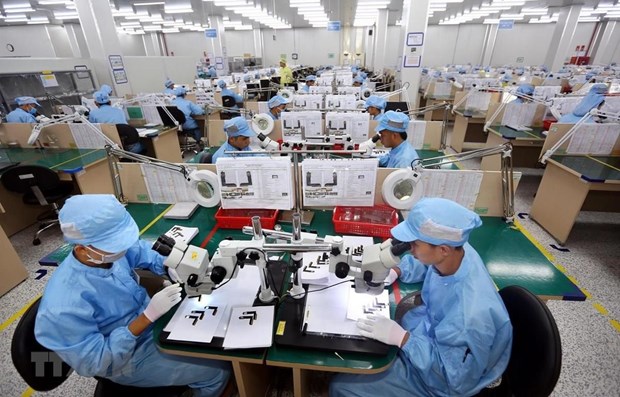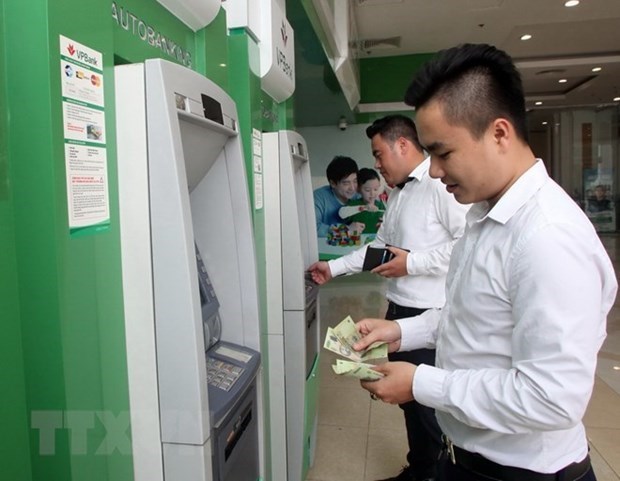Increasing demand for workers in H1
 Manufacturing sector is hoped to gain strong growth in the coming time. (Photo: VNA)
Manufacturing sector is hoped to gain strong growth in the coming time. (Photo: VNA)Hanoi (VNA) - With the effective control by the Government over the Covid-19 epidemic, the Vietnamese economy has recovered positively with the demands for production, business, and recruitment increasing.
According to the General Statistics Office, Vietnam is one of the major economies in ASEAN that still has positive growth with a GDP growth rate of 2.9% in 2020 in the context that the pandemic is still causing a profound impact on all aspects globally. Notably, the processing and manufacturing industry grew by 5.8%, contributing 1.25% to the overall growth of the whole economy.
Economic recovery with positive growth is expected to have a positive impact on future recruitment prospects. Recruitment needs in the first half of 2021 are expected to increase more than that in the last two quarters of 2020.
Huge demand for workers in manufacturing
The survey by ManpowerGroup Vietnam showed that up to 56% of enterprises intend to increase recruitment, while 37.3% said they have no intention to recruit more. Only 6.6% of enterprises participating in the survey said they would reduce recruitment.
According to Le Thi Kim, Head of Staffing & Outsourcing Service North Vietnam, ManpowerGroup, Vietnam still has many advantages to attract foreign investment in many fields from manufacturing, processing, assembly to food, warehousing thanks to the young, abundant human resources, ready to adapt to the diverse needs of employers.
“Currently, we receive many requests for labour supply in large numbers from domestic and foreign enterprises, especially in manufacturing. In particular, the average income of Vietnamese workers has increased to 321 USD per month, up 38.6% as compared with that in 2020, creating favorable conditions for unskilled workers to work and stick with businesses,” said Kim.
The survey also showed a positive signal that recruitment demand is gradually recovering and returning to pre-COVID-19 levels. In the long term, only about 3.2% of businesses predict it will take more than a year for recruitment to return to pre-COVID-19 time.
The recruitment demand is predicted to increase in the next 3-6 months and is most evident in the fields of manufacturing and processing, construction, wholesale, retail, trade, transportation, logistics, and information technology. In particular, manufacturing has the potential to develop strongly in the coming time. The construction sector also made a strong bounce back thanks to economic growth in the past year.
Nguyen Thu Trang, Country Head of Permanent Recruitment, Executive Search and Consulting Services at ManpowerGroup Vietnam said: “With the Government's effective control over the epidemic and the people's sense of good anti-epidemic compliance, Vietnamese economy is showing positive signs of recovery with increasing production and business demand”.
Besides, foreign investment capital continues to pour into Vietnam, creating more business opportunities and jobs in the country, Trang added.
“According to our observations, the job market is seeing a sharp increase in demand for positions that require skills that are relevant to the current landscape such as analysts, digital transformation, cybersecurity, financial technology (fintech), software engineer, etc”, she said.
Salary expected to increase in 2021
Along with increasing recruitment demand, workers also expect salary increases in 2021.
 Employees expect a salary increase in 2021. (Photo: VNA)
Employees expect a salary increase in 2021. (Photo: VNA)According to the Navigos Group's 2021 HR market survey, 43% of participants shared that they had never proposed a salary increase in 2020 and 42% said they still received a salary increase with increases from less than 3% to above 20%. However, entering 2021, employees show greater expectations with a salary increase.
When asked about adjustments in salary at enterprises, 10% of survey respondents said their salaries would decrease from less than 3% to more than 20%; 18% think the salary will not change. The remaining 61% think their salaries will be adjusted by certain percentages, from 3% to over 20%./.












